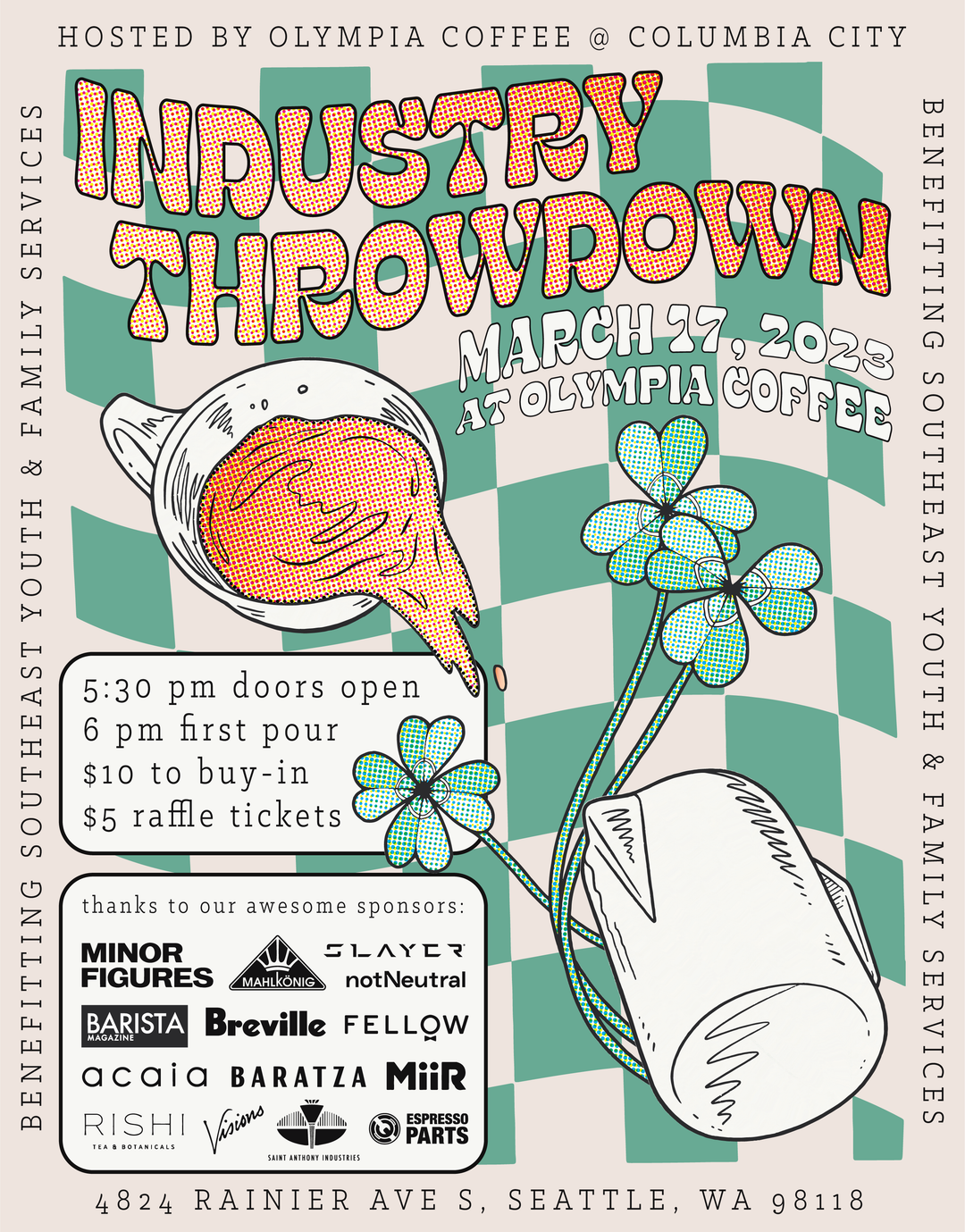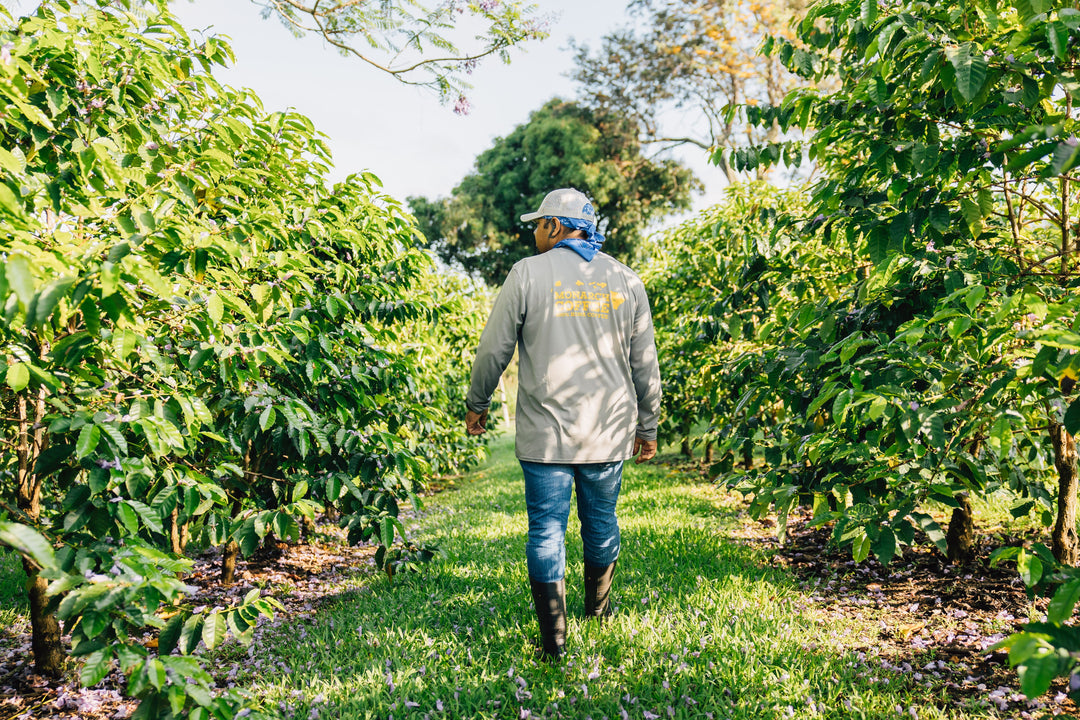Transparency Report 2018

In 2018, we continued our mission to improve quality of life for farmers in each of the origins in which we work. Every coffee we purchased last year continued to meet our groundbreaking Fair For All sourcing criteria, guaranteeing better pay, more transparency, living wages and safe working conditions for farm workers, while supporting continuous improvement to the highest quality coffee.
 We sourced over 175,000 pounds of green coffee from the seven origins where we work: Colombia, Hawaii, El Salvador, Guatemala, Burundi, Kenya and Ethiopia. We purchased 57 different lots of coffee from these origins, and the average price we paid to our partners in 2018 was $4.55 per pound FOB (Free On Board).
We sourced over 175,000 pounds of green coffee from the seven origins where we work: Colombia, Hawaii, El Salvador, Guatemala, Burundi, Kenya and Ethiopia. We purchased 57 different lots of coffee from these origins, and the average price we paid to our partners in 2018 was $4.55 per pound FOB (Free On Board).
2018 Highlights
 At the beginning of 2018 we became the first roaster in our industry to source coffees that are guaranteed as Fair For All. We created this new guideline to go beyond our own Direct Trade standards to include every individual who contributes to our coffees in our quality of life efforts.
At the beginning of 2018 we became the first roaster in our industry to source coffees that are guaranteed as Fair For All. We created this new guideline to go beyond our own Direct Trade standards to include every individual who contributes to our coffees in our quality of life efforts.
This means ensuring that our producers and partnering cooperatives set a sustainable minimum wage for their own workers, and requiring that our farms and partnering facilities provide working conditions that are free of unnecessary danger, with access to clean drinking water, for all their workers. We uphold these policies in-person throughout the year and build partnerships based on their needs.
Fair For All is also marked by a clear set of guidelines for our buying practices, allowing consumers, partnering businesses, and our own staff to know exactly how their coffee is sourced. This has represented our efforts to take transparency to the next level at Olympia Coffee and is detailed at our new informative website: FairForAll.Coffee

This year we have also added a new position to our team: Green Coffee Relationship Manager. This unique position is staffed by Marco Ariz (right) who grew up in El Salvador. Marco’s task is to provide the missing knowledge and personal support to every producer we work with by traveling to each origin during production. We believe that no other American roaster has yet provided this level of support to all their partnering farmers worldwide. Marco Ariz is new to our team, but has been integrated into our company for many years as a producer himself at his family farm El Aguila in Ahuachapan, El Salvador.
 In 2018, we also broke new ground in Ethiopia with our single producer program. With the help of Royal Coffee Importers we helped four of our producers to attain their own Export Licenses. These Export Licenses went to producers Adisu Kidane, Bedhatu Jibicho, Ayele Bedecha, and Desta Gola and they gave each of these producers a retention of 30% more income.
In 2018, we also broke new ground in Ethiopia with our single producer program. With the help of Royal Coffee Importers we helped four of our producers to attain their own Export Licenses. These Export Licenses went to producers Adisu Kidane, Bedhatu Jibicho, Ayele Bedecha, and Desta Gola and they gave each of these producers a retention of 30% more income.
 We also began a new project in the region of San Marcos, Guatemala during 2018. Our San Marcos Project began in 2017, but 2018 was the year we fruited our first purchase there. In San Marcos we have been working to identify producers with substantial potential for quality and, in return they receive much higher prices than they have ever received before. San Marcos is really undiscovered as a specialty region. Infrastructure in the San Marcos region is poor and the population is indigenous, which sadly has left the region largely undeveloped. We are working closely with Caravela Coffee Exporters on this project, using their year-round on the ground Agronomy support network. We are already seeing great progress.
We also began a new project in the region of San Marcos, Guatemala during 2018. Our San Marcos Project began in 2017, but 2018 was the year we fruited our first purchase there. In San Marcos we have been working to identify producers with substantial potential for quality and, in return they receive much higher prices than they have ever received before. San Marcos is really undiscovered as a specialty region. Infrastructure in the San Marcos region is poor and the population is indigenous, which sadly has left the region largely undeveloped. We are working closely with Caravela Coffee Exporters on this project, using their year-round on the ground Agronomy support network. We are already seeing great progress.
Understanding the Terms of Coffee Trade
The following glossary is an overview of common terms used in the coffee trade. These terms are listed here to guide you through the tables on the following pages, and give context for the purchases Olympia Coffee made during 2018.
Producer Name: This refers to either the farmer, cooperative, or project name, such as in the case of San Fermin.
Exporter: An Exporter is a company responsible for the export of green coffee. They provide services from the farm to the Port of Export. Prices paid to an Exporter include dry milling, preparation, bagging in Grain Pro, proper legal protocol, and completion of related paperwork. The FOB Price includes the Exporter Price plus the Producer Price.
Importer: The Importer is a company responsible for bringing the exported green coffee into US customs and a US Port of Entry. The Importer must provide documentation and transport from the Port of Entry to the end warehouse. Our coffees are brought into the ports of Oakland or Seattle. The FOT Price includes all of this work and the FOB Price. The FOT price may also include financing charges for the coffees we purchase.
Volumes: We base our volume projections on bags and/or boxes. However, bag/box sizes vary by origin. For simplicity we have listed the total weight of the purchase in pounds.
Producer Price: This is the take-home price for the coffee farmer, including farmers who are a part of a cooperative. For small farms where the farmer has no employees, this is also the Fair for All Price.

Picker’s Price: The Picker’s Price represents the documented commitment our farmer made, for what they would pay farm laborers, including pickers and processors, at a per pound price. Olympia Coffee’s Fair For All Standards require our farmers pay a fair and competitive wage within their community. A skilled picker can, on average, harvest about 100 lbs. of coffee cherry per day. N/A indicates that the Producer picked and processed the coffee themselves.
FOB Price: FOB stands for Free on Board, a term that means a coffee is ready for export, such as being “onboard” a ship. It represents that price paid to the Producer and Exporter. FOB prices are what are often mistakenly thought of as what the farmer was paid.
FOT Price: FOT stands for Free on Truck. Free on Truck is a coffee that has been exported, imported, and is sitting in a warehouse in the country where it will be roasted, ready for shipment to the roaster. The vast majority of specialty coffee roasters start their sourcing from coffees already brought to the FOT stage by an Importer. The FOT Price includes the Producer Price, plus Exporter and Importer costs. It may also include financing charges.
C Price and Fair Trade Price: All coffee is traded as a commodity on the C Market. C Market trading determines a global base FOB price for green coffee and it fluctuates daily as it’s traded. In 2018 the C Market, with inflation factored in, was at the lowest in history. Cost of production for the majority of producers was above the C Market. The C Market averaged $1.20 per lb. for 2018. The Fair Trade price in 2018 was $1.40 with an additional $0.30 for Certified Organic coffees.

Our Purchases During 2018


2019 Goals
In 2019 we go to another level with our Fair For All program by seeking to become certified as a B Corporation.
 Certified Benefit Corporations, or simply B Corps, are companies that are audited by a third party organization to help them verify and communicate the ways they benefit their stakeholders over their shareholder’s interests. This means B Corps prioritize benefiting their suppliers, employees, customers, community, and environment over simply benefiting share value or profits like traditional businesses.
Certified Benefit Corporations, or simply B Corps, are companies that are audited by a third party organization to help them verify and communicate the ways they benefit their stakeholders over their shareholder’s interests. This means B Corps prioritize benefiting their suppliers, employees, customers, community, and environment over simply benefiting share value or profits like traditional businesses.
We spent most of 2018 providing documentation and working with B Lab to verify that our Fair For All efforts are trustworthy for our customers. We are currently in the final steps of certification now. Learn more at bcorporation.net.
Further, as an integral part of becoming certified by B Lab, we have decided to amend our corporate status to become a Washington State Social Purpose Corporation. This unique corporate structure exists to help businesses like Olympia Coffee clearly state their purpose and intentions at a corporate level. We exist to create a higher quality of life for our farmers, staff, and customers through high quality coffee, and our legal structure will now reflect these efforts.
We are excited to continue sharing our goals in these new ways during 2019.






